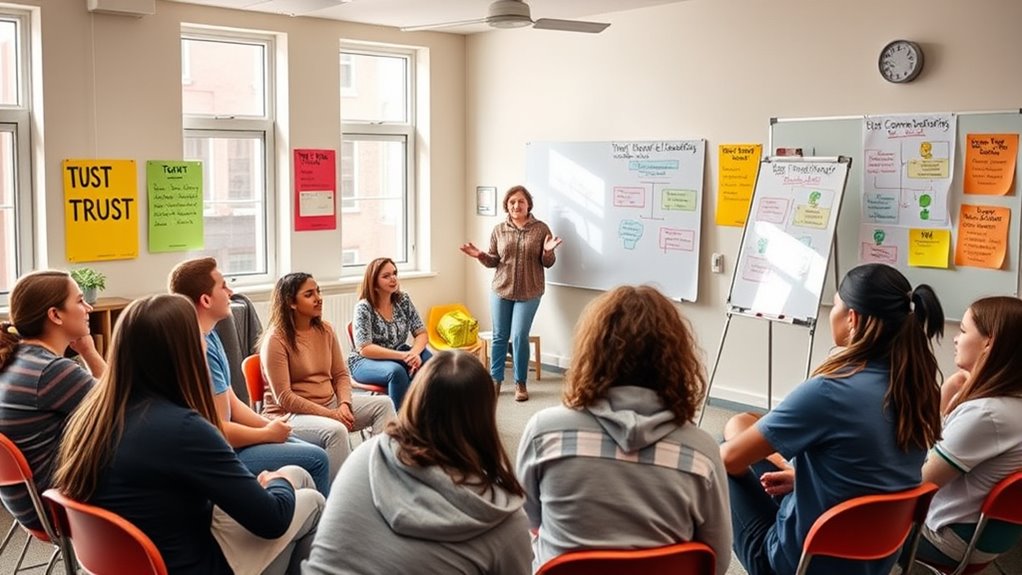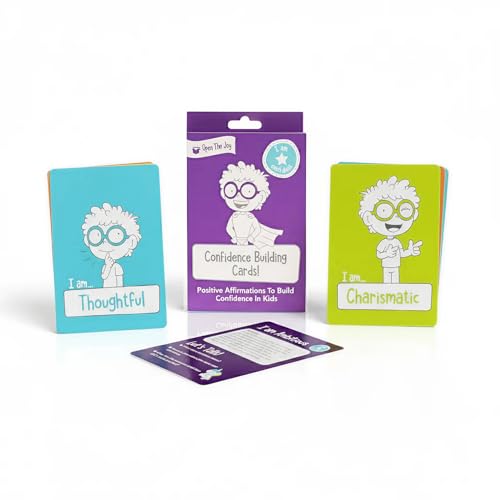To teach teenagers about healthy relationships, focus on helping them understand the importance of consent, open communication, and respecting boundaries. Encourage honesty and active listening, so they can express their feelings clearly and interpret others’ cues. Emphasize that boundaries are personal and essential for trust. Building these skills fosters mutual respect and confidence, creating strong, respectful connections. If you keep exploring, you’ll discover more ways to support teens in developing healthy relationship habits.
Key Takeaways
- Emphasize the importance of consent, communication, boundaries, and respect as foundational elements of healthy relationships.
- Teach teens that consent involves understanding feelings and comfort, not just yes or no responses.
- Encourage honest dialogue, active listening, and awareness of non-verbal cues to strengthen communication skills.
- Help teens identify, express, and respect personal boundaries to foster trust and mutual understanding.
- Empower teens with relationship skills to build confidence, empathy, and respect in all their interactions.

How can we best prepare teenagers to build healthy relationships? It starts with teaching them the importance of consent, communication, boundaries, and respect. These elements form the foundation of any strong, positive connection. When you talk to teenagers about consent, emphasize that it’s about more than just saying “yes” or “no.” It’s about understanding that both people have the right to their feelings, comfort levels, and personal space. Encourage open conversations where they feel safe asking questions and expressing their boundaries without fear of judgment or pressure. Explain that respecting someone’s boundaries isn’t just polite—it’s essential for trust and mutual understanding. Additionally, incorporating healthy relationship skills into education can further support their development.
Teaching teenagers about consent, boundaries, and respect builds trust and healthy relationships.
Communication is another essential aspect. Help teenagers recognize that healthy relationships depend on honest, respectful dialogue. Teach them to listen actively and to express their feelings clearly without blame or judgment. This means encouraging them to share what they’re comfortable with and to ask for clarification if something feels uncertain. Reinforce that good communication also involves paying attention to non-verbal cues, like body language and tone of voice, which often reveal feelings that words might not express. When teenagers know how to communicate effectively, they’re less likely to misunderstand each other and more likely to foster a relationship built on trust.
Setting and respecting boundaries is equally important. Explain that boundaries aren’t about limitations or restrictions—they’re about understanding what feels right for each person. Encourage teens to identify their own boundaries and to communicate them clearly to their partners. Equally important is teaching them to respect their partner’s boundaries, even if they differ from their own. Respect for boundaries shows that they value their partner’s feelings and autonomy. It also helps prevent conflicts and misunderstandings, creating a safe environment where both individuals can grow and thrive together.
Empowering teenagers with these skills helps them develop confidence in managing relationships. When they understand the importance of consent, communicate openly, and respect boundaries, they’re more likely to build genuine, respectful connections. These lessons aren’t just about avoiding harm—they’re about fostering a mindset that values mutual respect and understanding. As they grow, these principles will serve as guiding lights, helping them form relationships rooted in trust, empathy, and equality. Ultimately, teaching teenagers these core values prepares them not only for healthy romantic relationships but also for respectful interactions in all areas of life.

Consent: The New Rules of Sex Education: Every Teen's Guide to Healthy Sexual Relationships
As an affiliate, we earn on qualifying purchases.
As an affiliate, we earn on qualifying purchases.
Frequently Asked Questions
How Can Parents Effectively Discuss Relationship Topics With Teens?
When discussing relationship topics with teens, focus on communication strategies that foster openness and honesty. You should listen actively and ask non-judgmental questions to build trust. Share your own experiences and set a safe space for dialogue. Keep in mind, consistent, respectful conversations help teens feel comfortable, making it easier for them to share their thoughts and concerns about healthy relationships.
What Are Signs of Unhealthy Relationships Teenagers Should Watch For?
When looking out for signs of unhealthy relationships, you should watch for emotional manipulation and controlling behaviors. If your teen seems overly anxious, withdrawn, or constantly seeks approval, it could be a red flag. Controlling behaviors like dictating their choices or isolating them from friends are warning signs. Encourage open conversations so they feel safe sharing concerns, and help them recognize these warning signs early.
How Do Cultural Differences Impact Perceptions of Healthy Relationships?
Imagine you’re steering a social media feed from the 1800s—cultural norms and relationship expectations vary widely across cultures, shaping how people view healthy relationships. These differences influence what you consider respectful, loving, or acceptable behavior. Recognizing that cultural backgrounds impact perceptions helps you understand diverse relationship standards. By respecting these variations, you can foster empathy and promote healthier, more inclusive relationships, regardless of cultural differences.
When Should Teens Seek Help for Relationship Issues?
You should seek help when you notice signs of distress in your relationship, like constant arguing, feeling unsafe, or emotional exhaustion. Don’t ignore these feelings—talk to a trusted adult or a counselor. Seeking professional help early can provide support and guidance to navigate the situation. Remember, it’s okay to ask for help when things feel overwhelming, and addressing issues sooner rather than later is always best.
How Can Schools Incorporate Relationship Education Into Curricula?
You can incorporate relationship education into curricula by organizing engaging relationship workshops that teach essential communication and respect skills. Additionally, implementing peer mentoring programs allows students to learn from trusted classmates, fostering healthy relationship habits. These methods make the lessons relatable and practical, helping teens apply what they learn in real life. Schools that actively include these initiatives create a supportive environment where teenagers feel empowered to develop healthy relationship skills.

Letz Talk Conversation Cards for Teens – Communication Cards to Build Confidence & Emotional Intelligence, Family Games for Kids & Adults – Classroom Must Have – Therapy Game – Stocking Stuffer.
GET TEENS TALKING WITH PERFECT TABLE TOPICS: Some days you're their best friend and other days, their worst…
As an affiliate, we earn on qualifying purchases.
As an affiliate, we earn on qualifying purchases.
Conclusion
By teaching teenagers about healthy relationships, you empower them to build respectful, trusting connections. Remember, studies show that teens who receive relationship education are 30% more likely to recognize unhealthy behaviors early. This knowledge helps them make better choices and fosters healthier interactions. Keep encouraging open conversations and provide ongoing support. When teens understand what healthy looks like, you’re helping them create a foundation for respectful, fulfilling relationships now and in the future.
boundary setting activity kits for teenagers
As an affiliate, we earn on qualifying purchases.
As an affiliate, we earn on qualifying purchases.

Confidence Building Cards for Kids | 50+ Positive Affirmation & Self-Esteem Building Activities | Mindfulness, Emotional Intelligence & Self-Reflection Deck | Screen-Free Learning Tool for Ages 4+
BOOST SELF-ESTEEM & CONFIDENCE: Inspire kids to believe in themselves with 50+ positive affirmation cards designed to build…
As an affiliate, we earn on qualifying purchases.
As an affiliate, we earn on qualifying purchases.









